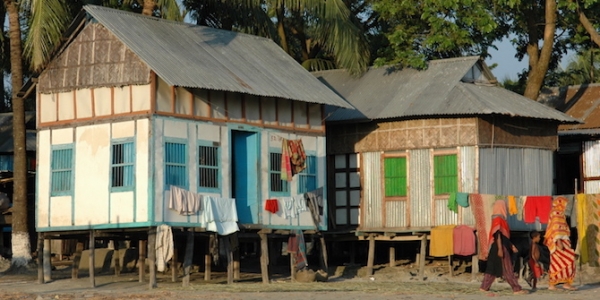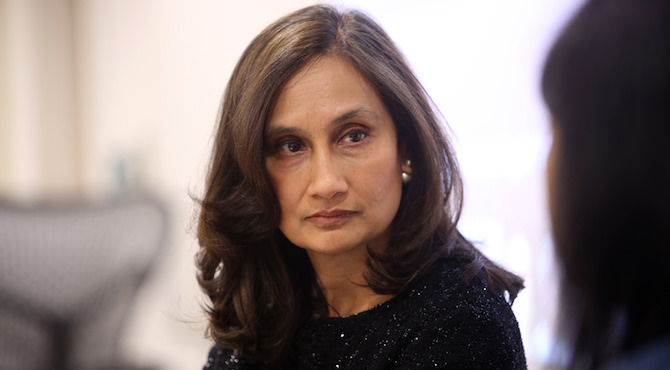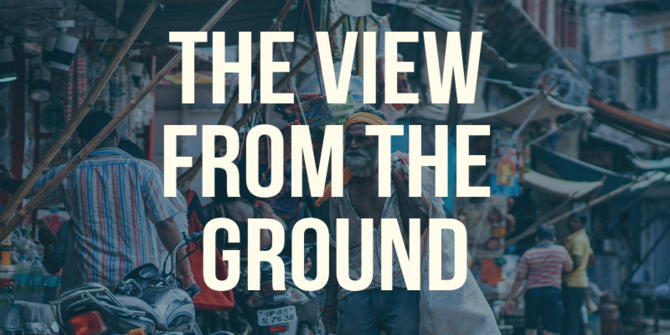 Earlier this year, Naomi Hossain drew on her latest book The Aid Lab to discuss Bangladesh’s development at the South Asia Centre. Before the session, Sonali Campion interviewed her about how crises before and after independence may have paved the way for development success, and the lessons other countries can take from Bangladesh.
Earlier this year, Naomi Hossain drew on her latest book The Aid Lab to discuss Bangladesh’s development at the South Asia Centre. Before the session, Sonali Campion interviewed her about how crises before and after independence may have paved the way for development success, and the lessons other countries can take from Bangladesh.
SC: Your new book ‘The Aid Lab’ explores the Bangladesh paradox of poor governance, high corruption, and rapid social progress. One of the things you look at is how the crises in the 1970s actually laid the foundation for the development successes. Tell me more about this.
NH: There were a series of crises in the early 1970s, starting with the Bhola cyclone in 1970. People have largely forgotten about it, but most political scientists agree that it was the trigger for independence. It was one of the most destructive cyclones ever (even if you take into account the 2004 tsunami), something like half a million people were killed. Bangladesh was still East Pakistan at the time, and the Pakistan government didn’t do much about it. They showed that they didn’t really care – and then there were elections 3 weeks later. These were Pakistan’s first proper democratic elections and the East Pakistan Awami League headed by Sheikh Mujibur won a landslide. They weren’t allowed to form a government, which led to the war.
As a result the new government in independent Bangladesh had to be responsive to natural disaster, because it was part of their mandate. When the famine struck in 1974 it was unusual famine because it wasn’t that the government didn’t want to respond. They knew it was important for their survival, partly because of the Bhola cyclone but also because the Bangladeshi people were always facing these kinds of crisis. We had the famine of 1943-44, the Churchill famine as we think of it now, so it was not a new problem.
Around 1.5million people died in 1974. As with all famines there were multiple causes but ultimately, the government was blamed for not acting. After the famine there was a massive political crisis and Sheikh Mujibur and his family were killed. It became an existential crisis for the elite itself, which realised that their own survival depended on tackling these issues. So I think a tacit social contract emerges out of these disasters and the political crises that followed. This was an unusual contract because it brought together the political elites, and the population as a whole but also the aid donors.
Do you think that elites were motivated by a desire to show better governance in the face of natural disaster than West Pakistan?
They had to show they were not like the Pakistani rulers, they had to show these are our people, we care about them and so on. But there’s also something particular about the Bangladeshi elite – although this has changed somewhat now. In those days it was distinctive because it was very similar to the masses. There’s a real affinity between rural population and the ruling classes: they’re all Bengali Muslims, they speak the same language, and they have similar backgrounds. Some people have said, “You can’t call these people ‘elite’, they were the rural middle classes with a bit of upward mobility”, i.e. they were in social terms very close to the population.
This has an impact on how they feel about the population. Ethiopia had a famine at exactly the same time, but the ruler sitting in Addis Ababa is King and God in perpetuity. The people who are starving are to him different people far away. It’s a totally different political scenario.
Was it ever fair to call Bangladesh a basket case?
It was never fair but it was moderately appropriate at that moment in 1970s when Henry Kissinger famously used the term. Nobody had really focussed on this part of the world properly before, it had always been bundled together with Pakistan and India, and there was a high concentration of poverty, deprivation and disasters. The CIA in fact wrote a report in which they were almost agog; they couldn’t believe that so many poor people could live in such bad circumstances in such a small landmass.
The basket case label has dogged Bangladesh, even now politicians talk about it, there’s a whole big agenda around ridding ourselves of this. However, it was problematic because it didn’t take into account the political reasons why this area was in this condition, whether it was the repression, extraction, and indebtedness which had come with colonialism, or the continued extraction under neo-colonial rule following independence. So it was kind of accurate, but there was little attempt to understand why.
The book uses Bangladesh as a case study but it tries to draw out lessons for other developing countries. What are the recommendations?
Bangladesh is a useful example in at least two respects. One is in terms of vulnerability to climate change. Bangladesh has been feeling the effects of climate change for a century according to some estimates. Now others are experiencing climate change-related disasters, you see this wave of famines in the Middle East and around the Horn of Africa, in widespread drought and so on. We should learn lessons about institutionalising protection against disasters. It’s not perfect in Bangladesh but they’ve done well there because it’s a priority that is above politics.

Bangladesh also moved into global markets very early on, much earlier than other low or lower middle income countries, if only because we had nothing else to sell but our labour. It’s difficult to navigate a position in the global system but Bangladesh seems to have found a balance that works in terms of labour markets, exports, and climate change priorities. Interestingly, these are two areas in which we see Bangladeshis taking a real lead on the world stage, whether it is at the Paris Climate negotiations, or WTO negotiations. These also recently become more vocal on labour migration and migrant rights issues.
How does this work intersect with your research on access to food and mobilisation around hunger?
There’s a lot of discussion around the right to food now, especially in the wake of the 2008 global food crisis. The Bangladesh case is relevant because it shows that this social contract that is the bedrock of any kind of economic and social development policy. Not everywhere has great food insecurity, but those places that do would do well to think about how this right to food is institutionalised. That’s an important area of intersection.
I was doing a piece of work on food riots and food rights after the global food crisis, which is really what got me thinking about the famine in Bangladesh and this book. I was working with a colleague of mine on a comparative study of different countries. Bangladesh had a pretty strong response to the 2008 global food price spike, even though it was a difficult time for them – they had an interim government, India had closed its borders and wasn’t selling rice, but they managed to pull it out of the hat. We were asking all these policymakers and scholars, “Why did Bangladesh, compared to Kenya or Mozambique or even India, have such a good response?” They would look at us blankly as if we were stupid and then they would say, “Because of the famine”.
People don’t talk about the famine. They talk about ’43 but they don’t talk about ’74. I thought there was something interesting in that silence that I wanted to understand. My sense is that there is a lingering middle class elite guilt about the 1974 famine. It’s very interesting to think about how the centuries-long struggles over food in Europe and the relationships between states and markets and citizens where resolved in more integrated food markets, more responsive states and so on. In Bangladesh I think they were forced to get there a bit earlier. If you don’t have food security what development can you have?
You’re beginning to touch on governance. In the Bangladesh Paradox idea, the government is often just written off. What are the prospects for the having an impact on the NGO success we have seen (good or bad)?
Bangladesh is one of the examples that might suggest you don’t need liberal democracy to have development. On the other hand, most of the progress, particularly around human development, happened in the more competitive multiple party period from 1991 onwards. There’s clearly a sense in which proper political competition, free civil society, a vibrant media and so on has made a difference.
That said, some difficult development decisions, particularly around things such as infrastructure are hard to take when you have short time horizons in the rural elite. It’s hard to build major bridges or big road systems when you think you’re going to get turfed out in 5 years time, particularly when large payments are needed to make them happen, which we understand is still pretty standard in Bangladesh.
The closing of the political space now is interesting because there is great potential risk, but development on all sorts of fronts has actually been proceeding very nicely in the last 5 or so years – you have high rates of growth, a lot of investment in human development and so on. Having a dominant party is not bad necessarily for most kinds of development. I think this is the Rawanda story too.
But Bangladesh is a very different society, it’s very fractious and competitive, people do resent the closing of the political space. Some say it is directly related to the rise of extremism and that’s been a bit of a shock in Bangladesh. I think that might be true but I don’t know. What is worrying is the closure of the space for civil society and the media could have a real impact on the government’s transparency and responsiveness. So for instance if we were to have a major food crisis somewhere remote now, it’s not entirely clear to me that the media would free to report it, and that the government would feel pressured to respond. It’s something we have to watch.
A second specific concern is the unreliability of statistics under closed systems. You can’t really have a successful development model if you’re not tracking and monitoring. It’s a matter of accountability.
Listen to the podcast from Dr Hossain’s talk Out of the basket: Lessons from Bangladesh’s development successes here.
This article gives the views of the authors, and not the position of the South Asia @ LSE blog, nor of the London School of Economics. Please read our comments policy before posting.
About the Authors
 Dr Naomi Hossain is a political sociologist with 20 years of development research and advisory experience. She is currently Research Fellow at the Institute of Development Studies. Her work focuses on the politics of poverty and public services, and increasingly on the political effects of subsistence crises. Dr Hossain is author of The Aid Lab: Understanding Bangladesh’s Unexpected Success, published this year (available here).
Dr Naomi Hossain is a political sociologist with 20 years of development research and advisory experience. She is currently Research Fellow at the Institute of Development Studies. Her work focuses on the politics of poverty and public services, and increasingly on the political effects of subsistence crises. Dr Hossain is author of The Aid Lab: Understanding Bangladesh’s Unexpected Success, published this year (available here).
 Sonali Campion is Communications and Events Officer at the South Asia Centre. She holds a BA (Hons) in History from the University of Oxford and an MSc in Comparative Politics from LSE. She tweets @sonalijcampion.
Sonali Campion is Communications and Events Officer at the South Asia Centre. She holds a BA (Hons) in History from the University of Oxford and an MSc in Comparative Politics from LSE. She tweets @sonalijcampion.







